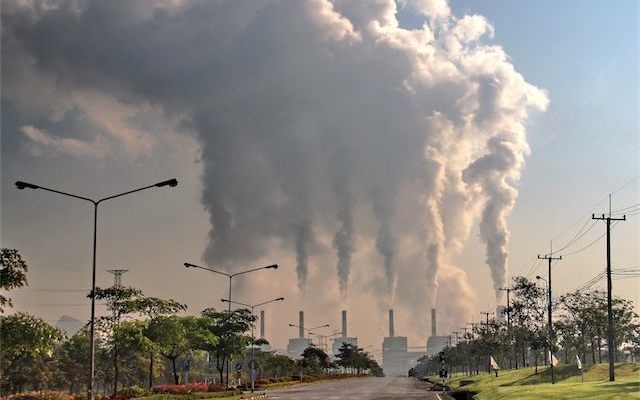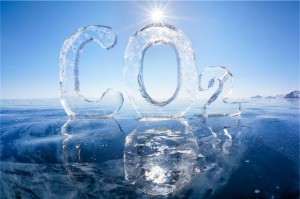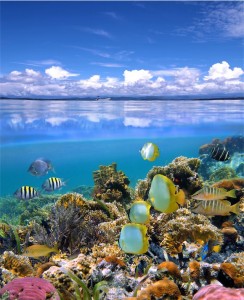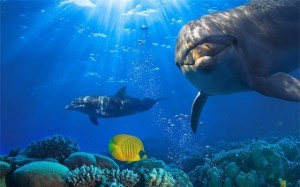Ocean Acidification – the Evil Twin of CO2 Greenhouse Heating
It‘s not even faintly debatable. It’s straight-up chemistry like coca-cola and tums. Raising atmospheric CO2 is changing the oceans irreversibly on human timescales.
There’s a lot of talk about CO2 these days.
It’s a vital chemical to biology. Its greenhouse effects ages ago rescued the earth from having permanent frozen seas. Its levels in the oceans, and in all living organisms including ourselves, strike a delicate balance which makes the kind of complex life we know possible.
We evolved in the sea, and we carry an ocean with us. Our bodies contain a modified version of early seas which were a lot less salty than they are now. If the balance of CO2 falls out of the ideal range, we suffer ill effects and then die.
CO2 is also what you get when you burn carbon.
Our species found billions of tons of fossil carbon which had been sequestered, locked away from the oceans and biosphere, in hellish times past, back when the seas were slime and the climate was nothing we’d care to visit.
Without realizing the full implications, we decided it might be a good idea to burn as much carbon as we could dig up. Now that we’re discovering it is a threat to life as we know it, our lifestyle and economy is invested in burning more carbon every year. It would cause us some temporary hardship to stop burning it. So we aren’t.
Despite all talk, despite windmills and solar panels and nukes and stuff, we’re still burning more carbon every year than was ever burned before.
The whole debate about this these days centers on so-called “global warming” or its euphemism “climate change”. The reason it’s frame as debate at all is the quaint notion that the facts of science are arrived at in the same way as reality TV shows or the relative merits of naming one state flower over another.
This is largely due to the inherently difficult nature of sophisticated scientific predictive models.
They can be very useful, but they are inexact; so a person skilled in rhetoric can use cherry-picked excerpts to call into question even the first-order effects which require no modeling at all and derive from straight physics.Like CO2 heating of the planet, which discovery won the Nobel prize in 1896. So some embarrassingly-high percentage of the US population is of the opinion that the “science isn’t in” on CO2 heating of the biosphere, using the same scientific methods and peer-review standards they apply to questions like Kim Kardashian’s rump size and the best color for a truck.
However, Ocean Acidification isn’t subject to rhetorical manipulation short of flat-out lying, and it’s set to cause planetary disaster much quicker than CO2 greenhouse heating. And it’s off nearly everyone’s radar.
No scientific modeling is needed. Acid dissolves all forms of calcium carbonate. Period.
Calcium carbonate (calcite), and its more soluble form aragonite, cannot exist in water past a given level of acidity/alkalinity. These materials are utterly crucial to ocean life systems as they are now evolved. They form coral reefs, they form the skeletons of free-swimming creatures, they enable the plankton community which supports complex active sea life with the energy to exist.
An acidified, warmed ocean is a dead ocean by the standards humans have always known. It’s an ocean primarily without vertebrates. It’s stratified and anoxic, with few currents. It’s home to toxic bacteria which create chemicals like H2s – poison gas – that are inimical to complex life.
And we’re locking it in. As this is written, we are not inexorably committed to dead seas, though it’s not looking good.
But with carbon-burning business as usual, it will become inevitable during your lifetime if you’re 40 or younger.
Unless, during your lifetime, something about the world changes.
That’s the idea.
Making Dolphins the Global Face of CO2 Pollution
ET’s dolphin-saving campaign is the most successful nonprofit program of its kind. It has now embarked on a new dolphin-saving campaign: the AcidSeas initiative.
Quite simply, dolphins cannot be expected to survive the food web collapses of acidified seas which don’t support calcium carbonate skeletons that a huge portion of sea creatures require.
If you agree with us that this is a vital campaign – and that moreover it is a more useful framing for CO2 pollution than the gridlocked “global warming” campaign, we need you involved.
Check out The Flipper Fund’s AcidSeas Campaign.
Join the ET Acidification Campaigns
ET will be campaigning against ocean acidification on several fronts. Its “FlipperFund” dolphin campaign will feature dolphins as one of the unavoidable casualties of human CO2 emissions, rallying true conservatives to keep the seas in a condition that allows dolphins to continue living.
It will also seek to engage the world on the CO2 issue in general – not just regarding dolphins – through both traditional and very non-traditional organizing and strategizing, The FutureSeas Campaign will inject new concepts and framings into popular culture, re-presenting the CO2 issue in terms that can’t be debated to a standstill. And setting tough targets for personal and cultural heroism.
And perhaps the most far-reaching program of all will be the new Bottleneck Foundation, a program of science synthesis, ethics, evolutionary psychology and systems thinking which will offer new and better ways of using science and our modular human minds to make it to a better human future than we are currently heading for. Stay tuned.
Acidification Links and Resources
CLICK HERE to go to a page of acidification links which we add to from time to time.











